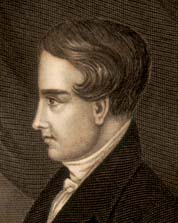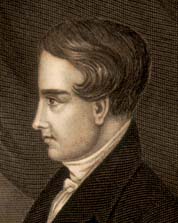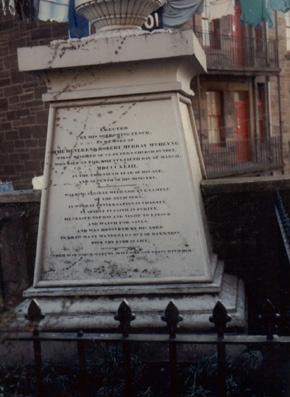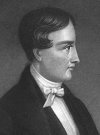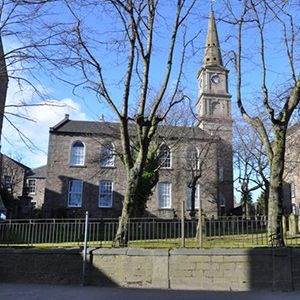Robert Murray McCheyne, one of the saintliest men who ever lived, was in his eighteenth year when his brother died. From that day forward his friends observed a change. His poetry was pervaded with serious thought, and all his pursuits began to be followed out in another spirit.
A year after, he writes in his diary: "On this morning last year came the first overwhelming blow to my worldliness; how blessed to me, Thou, O God, only knowest, who hast made it so."
On one occasion, a few of us who had studied together, were reviewing the Lord's dealings with our souls, and how He had brought us to Himself, all very nearly at the same time, though without any special instrumentality. He stated that there was nothing sudden in his case, and that he was led to Christ through deep and ever-abiding, but not awful or distracting convictions.
The Holy Spirit carried on His work by continuing to deepen in him the conviction of his ungodliness, and the pollution of his whole nature. And all his life long, he viewed his original sin, not as an excuse for his actual sins but as an aggravation of them all. In this view he was of the mind of David, taught by the unerring Spirit of Truth (Psa. 51:4,5).
He thought himself much profited, at this period, by investigating the subject of Election and the Free Grace of God. But it was the reading of "The Sum of Saving Knowledge," generally appended to the Confession of Faith, that brought him to a clear understanding of the way of acceptance with God.
And now, with altered views, with an eye that could gaze on Heaven and Hell, and a heart that felt the love of a reconciled God, he sought to become a herald of salvation.
In the winter of 1831 he commenced his studies in the Divinity Hall, under Dr. Chalmers and Dr. Welsh; and he was licensed as a preacher by the Annan presbytery on 1 July 1835. In the following November he was appointed assistant to the Rev. John Bonar of Larbert and Dunipace, Stirlingshire. His health, which had never been robust, broke down under the strain of his new office; but his fame as a preacher spread through Scotland, and on 24 November 1836 he was ordained to the pastorate of St. Peter's Church, Dundee, which had been erected into a quoad sacra parish in the preceding May. The congregation numbered eleven hundred hearers, and McCheyne addressed himself to the work of the ministry with so much ardour that his health again gave way, and in December 1838 he was compelled to desist from all public duty. At this time the general assembly of the church of Scotland decided to send a committee to Palestine to collect information respecting the Jews, and McCheyne was included in the number who set sail on 12 April 1839. The record of this journey was written jointly by McCheyne and his companion Andrew Bonar (died 1892), and was published in 1842. After his return at the end of 1839 McCheyne resumed his ministerial duties in Dundee with renewed energy. In the autumn of 1842 he visited the north of England on an evangelical mission, and made similar journeys to London and Aberdeenshire. On his return from the latter place he was seized with sudden illness, and died on Saturday, 25 March 1843. He was buried beside St. Peter's Church, Dundee, where an imposing tombstone marks his grave.
McCheyne devoted all his energies to preaching; and although he was an accomplished Hebrew scholar, he left few permanent proofs of his erudition. He had refined musical taste, and was one of the first of the Scottish ministers to take an active part in the improvement of the congregational service of praise. Long after his death he was constantly referred to as 'the saintly McCheyne.' Several hymns by him — notably that entitled 'When this passing World is done' — are in constant use in the Scottish churches. His principal works are:
1. 'Narrative of a Mission of Inquiry to the Jews' (jointly with Dr. Andrew Bonar), Edinburgh, 1842.
2. 'Expositions of the Epistles to the Seven Churches of Asia,' Dundee, 1843.
3. 'The Eternal Inheritance: the Believer's Portion, and Vessels of Wrath fitted to Destruction, two Discourses,' Dundee, 1843.
4. 'Memoirs and Remains' (published by Dr. Andrew Bonar), Edinburgh, 1843 (second edition, with additional matter, Edinburgh, 1892).
5. 'Additional Remains, Sermons, and Lectures,' Edinburgh, 1844.
6. 'Basket of Fragments, the substance of Sermons,' Aberdeen, 1849.
CHRONOLOGY OF HIS LIFE:
1813--Born in Edinburgh, Scotland (May 21).
1821--Entered High School, Edinburgh (Oct).
1827--Entered Edinburgh University at the age of fourteen Nov).
1829--Became member of St. Stephen's Church, Edinburgh.
1831--David, his brother, died (July 8).
Presented himself to the Church of Scotland Edinburgh Presbytery as a candidate for the ministry (Sept 18).
1834--Wrote the hymn "Jehovah Tsidkenu."
1835--Licensed by the presbytery of Annan (July 1).
Began work as an assistant at Larbert (Nov 7).
1836--Ordained and inducted to the pastorate of St. Peter's Church, Dundee (Nov 24).
1839--Went on expedition to Palestine for six months.
Revival commenced at St. Peter's Church, Dundee, with missionary William Burns.
1840--Went to Ireland and spoke in Belfast and Dublin about church's responsibilities for the Jew people (July)
1842--Devised his yearly calendar for reading the Old Testament once and the New Testament and Psalms twice.
1843--Preached last sermon at St. Peter's (March 12).
1843--Died at age 29 (March 25).
1844--Publication of Memoir and Remains of Robert Murray McCheyne by Andrew Bonar.
References: Bonar's Memoirs; Jean L. Watson's Life of Robert Murray McCheyne; Dundee Celebrities; Scott's Fasti, iii. 700.
Copied by Stephen Ross for WholesomeWords.org from Dictionary of National Biography. London: Smith, Elder, & Co., 1893.
Robert Murray McCheyne, one of the saintliest men who ever lived, was in his eighteenth year when his brother died. From that day forward his friends observed a change. His poetry was pervaded with serious thought, and all his pursuits began to be followed out in another spirit.
A year after, he writes in his diary: "On this morning last year came the first overwhelming blow to my worldliness; how blessed to me, Thou, O God, only knowest, who hast made it so."
On one occasion, a few of us who had studied together, were reviewing the Lord's dealings with our souls, and how He had brought us to Himself, all very nearly at the same time, though without any special instrumentality. He stated that there was nothing sudden in his case, and that he was led to Christ through deep and ever-abiding, but not awful or distracting convictions.
The Holy Spirit carried on His work by continuing to deepen in him the conviction of his ungodliness, and the pollution of his whole nature. And all his life long, he viewed his original sin, not as an excuse for his actual sins but as an aggravation of them all. In this view he was of the mind of David, taught by the unerring Spirit of Truth (Psa. 51:4,5).
He thought himself much profited, at this period, by investigating the subject of Election and the Free Grace of God. But it was the reading of "The Sum of Saving Knowledge," generally appended to the Confession of Faith, that brought him to a clear understanding of the way of acceptance with God.
And now, with altered views, with an eye that could gaze on Heaven and Hell, and a heart that felt the love of a reconciled God, he sought to become a herald of salvation.
In the winter of 1831 he commenced his studies in the Divinity Hall, under Dr. Chalmers and Dr. Welsh; and he was licensed as a preacher by the Annan presbytery on 1 July 1835. In the following November he was appointed assistant to the Rev. John Bonar of Larbert and Dunipace, Stirlingshire. His health, which had never been robust, broke down under the strain of his new office; but his fame as a preacher spread through Scotland, and on 24 November 1836 he was ordained to the pastorate of St. Peter's Church, Dundee, which had been erected into a quoad sacra parish in the preceding May. The congregation numbered eleven hundred hearers, and McCheyne addressed himself to the work of the ministry with so much ardour that his health again gave way, and in December 1838 he was compelled to desist from all public duty. At this time the general assembly of the church of Scotland decided to send a committee to Palestine to collect information respecting the Jews, and McCheyne was included in the number who set sail on 12 April 1839. The record of this journey was written jointly by McCheyne and his companion Andrew Bonar (died 1892), and was published in 1842. After his return at the end of 1839 McCheyne resumed his ministerial duties in Dundee with renewed energy. In the autumn of 1842 he visited the north of England on an evangelical mission, and made similar journeys to London and Aberdeenshire. On his return from the latter place he was seized with sudden illness, and died on Saturday, 25 March 1843. He was buried beside St. Peter's Church, Dundee, where an imposing tombstone marks his grave.
McCheyne devoted all his energies to preaching; and although he was an accomplished Hebrew scholar, he left few permanent proofs of his erudition. He had refined musical taste, and was one of the first of the Scottish ministers to take an active part in the improvement of the congregational service of praise. Long after his death he was constantly referred to as 'the saintly McCheyne.' Several hymns by him — notably that entitled 'When this passing World is done' — are in constant use in the Scottish churches. His principal works are:
1. 'Narrative of a Mission of Inquiry to the Jews' (jointly with Dr. Andrew Bonar), Edinburgh, 1842.
2. 'Expositions of the Epistles to the Seven Churches of Asia,' Dundee, 1843.
3. 'The Eternal Inheritance: the Believer's Portion, and Vessels of Wrath fitted to Destruction, two Discourses,' Dundee, 1843.
4. 'Memoirs and Remains' (published by Dr. Andrew Bonar), Edinburgh, 1843 (second edition, with additional matter, Edinburgh, 1892).
5. 'Additional Remains, Sermons, and Lectures,' Edinburgh, 1844.
6. 'Basket of Fragments, the substance of Sermons,' Aberdeen, 1849.
CHRONOLOGY OF HIS LIFE:
1813--Born in Edinburgh, Scotland (May 21).
1821--Entered High School, Edinburgh (Oct).
1827--Entered Edinburgh University at the age of fourteen Nov).
1829--Became member of St. Stephen's Church, Edinburgh.
1831--David, his brother, died (July 8).
Presented himself to the Church of Scotland Edinburgh Presbytery as a candidate for the ministry (Sept 18).
1834--Wrote the hymn "Jehovah Tsidkenu."
1835--Licensed by the presbytery of Annan (July 1).
Began work as an assistant at Larbert (Nov 7).
1836--Ordained and inducted to the pastorate of St. Peter's Church, Dundee (Nov 24).
1839--Went on expedition to Palestine for six months.
Revival commenced at St. Peter's Church, Dundee, with missionary William Burns.
1840--Went to Ireland and spoke in Belfast and Dublin about church's responsibilities for the Jew people (July)
1842--Devised his yearly calendar for reading the Old Testament once and the New Testament and Psalms twice.
1843--Preached last sermon at St. Peter's (March 12).
1843--Died at age 29 (March 25).
1844--Publication of Memoir and Remains of Robert Murray McCheyne by Andrew Bonar.
References: Bonar's Memoirs; Jean L. Watson's Life of Robert Murray McCheyne; Dundee Celebrities; Scott's Fasti, iii. 700.
Copied by Stephen Ross for WholesomeWords.org from Dictionary of National Biography. London: Smith, Elder, & Co., 1893.
Bio by: Ron Buchinski
Family Members
Advertisement
Advertisement
